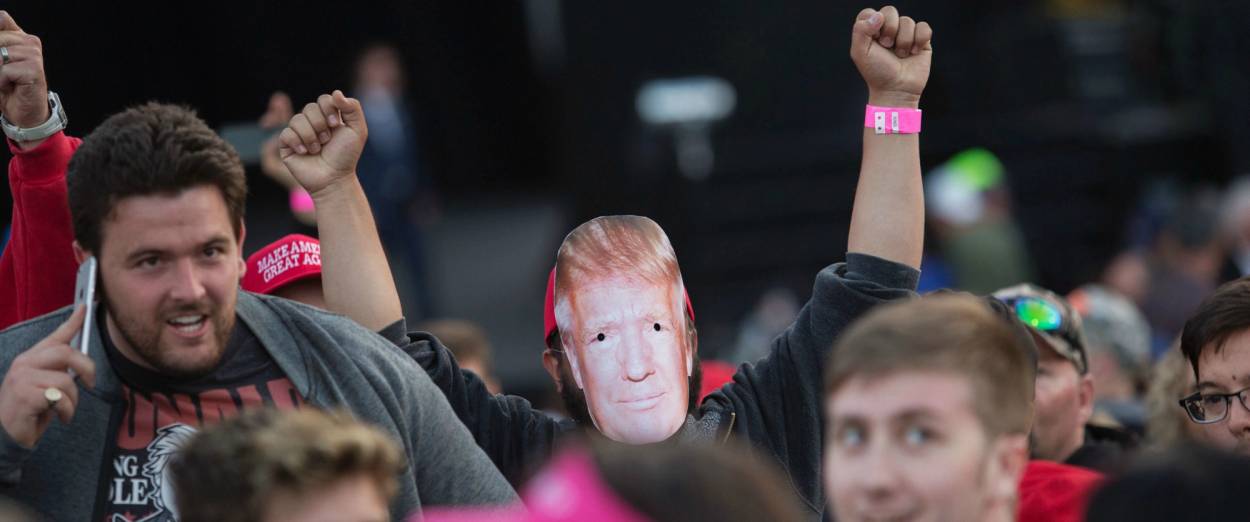Shabbat Dinner With a Trump Supporter
I experienced a wake-up call when I met my first Trump supporter, a person with whom I thought I could not identify





All signs, unfortunately, are pointing to a Donald Trump victory in the Indiana primaries on Tuesday. I’ve had lots of trouble, to say the least, understanding Trump’s appeal—personal, political, and otherwise. I don’t understand why anybody would support an apparently sexist, racist, entitled, unintelligent, uninformed, fear-inducing, violence-encouraging person to make decisions as Leader of the Free World. And, besides, he’s not even a good businessman, contrary to what you may have enjoyed on TV.
And yet, Trump is steamrolling his way to the Republican candidacy, so he must have some supporters. But I—a New York City-dwelling, liberal university-attending, millennial card-carrying woman—had never met one. Before this past weekend that is.
For the final few days of Passover, I accompanied my family to a Shabbat meal at the home of a family friend. Save for the mazto we ate in challah’s stead, our meal started out as rather unremarkable. Then the conversation turned to the 2016 presidential election.
As a loud and proud supporter of Hillary Clinton (after a not-so-brief fling of feeling the Bern), I’m more than happy to have my political opinions challenged. I deserve to be questioned back. We all do. This is the beauty of public discourse. But when the meal conversation turned political, the words “challenge” and “debate” and “question” lost their applicability. The road to intellectual dialogue instead became pocked by bombast and belligerence, and led to nowhere, because a real, live Donald Trump supporter—a Jewish doctor from the tri-state area, no less—turned Shabbat dinner into my nightmare.
Predictably, the Trump supporter took center stage, demanding the dining room’s incandescent spotlight that hung over the table. One by one, he began asking the rest of us questions—answers to which he restricted to a “yes” or “no.” In retrospect, I shouldn’t have bit.
“Do you think every foreign disease-ridden terrorist should be able to come to the United States and get automatic citizenship?” he asked.
I was shocked. “No, but that’s not what—”
“Then you agree with Trump! Do you believe doctors should be able to make a living wage?”
“Yes, and so do—”
“Great! You’re a Republican!”
The Trump supporter made his way around the table with gotcha-questions like these, his voice ever escalating as he denied input from anyone else. He dismissed accusations of Trump’s racism as left-wing media bias. He downplayed Trump’s noted sexism as “just a joke.” He rejected the facts of climate science, homophobia, and basic economics along the way. He refused to entertain the notion that a reality TV star might not be the person alive today who is most singularly qualified for the highest office in the land. And, when I brought up Clinton, he responded in one- or two-word barks: “Benghazi!” “Her emails!” “Clinton Foundation!”
I tried responding with reason, but this was in vain. When I mentioned that a Benghazi metric ought to consider the embassy attacks and personnel deaths of the George W. Bush years, the Trump supporter shook his head and yelled, “It’s different!” He didn’t explain why. When I pressed him on other issues, wishing to enter into a dialogue, all I got was more barking. By the time a flourless chocolate cake was served for dessert, I had thrown in the towel and decided his bellicosity just wasn’t worth it.
Needless to say, no one left the Shabbat meal with changed politics. But a few days later, the experience has continued to stick with me. For the first time, I got a look inside the mind of a Trump supporter and here’s what I found: an insistence on simplification and classification. The world according to this particular Trump supporter—whom I recognize could in fact be the exception—is best viewed in black and white, in terms of us versus them, good versus bad. This is a worldview that mocks nuance, that lampoons detail. It’s a worldview best championed by a man who got famous once by firing people on TV, and once more by crusading for a wall, and once again for saying Mexicans are drug-running rapists (“Some, I assume, are good people.”).
I’m hardly confident in Trump’s ability to win any sort of general election, because I’m counting on the American people to stop this demagogue’s power trip before it’s too late. Is it too late? In any case, I now know better than to dismiss Trump’s supporters as universally uneducated or evangelical or limited to a certain demographic, as would be easy to do, given that his apparent “appeal” leaves me ineffable. The next time I watch footage from a Trump rally, I’ll think of the doctor I met at a meal who—with a radically different background from Trump’s stereotypical voter—supports the GOP frontrunner all the same. I now know some of my biggest opponents may in fact be sitting across from me at the Shabbat table.
Related: Trump Watch [Tablet series]
Jordana Narin is an intern at Tablet